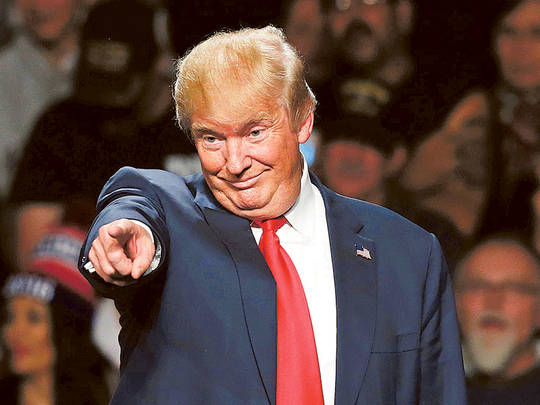
Washington: For much of the summer, the FBI pursued a widening investigation into a Russian role in the US presidential campaign. Agents scrutinised advisers close to Donald Trump, looked for financial connections with Russian financial figures, searched for those involved in hacking the computers of Democrats, and even chased a lead — which they ultimately came to doubt — about a possible secret channel of email communication from the Trump Organization to a Russian bank.
Law enforcement officials say that none of the investigations so far have found any conclusive or direct link between Trump and the Russian government. And even the hacking into Democratic emails, FBI and intelligence officials now believe, was aimed at disrupting the presidential election rather than electing Trump.
Hillary Clinton’s supporters, angry over what they regard as a lack of scrutiny of Trump by law enforcement officials, pushed for these investigations. In recent days they have also demanded that James B. Comey, the director of the FBI, discuss them publicly, as he did last week when he announced that a new batch of emails possibly connected to Clinton had been discovered.
Supporters of Clinton have argued that Trump’s evident affinity for Russia’s president, Vladimir V. Putin — Trump has called him a great leader and echoed his policies toward Nato, Ukraine and the war in Syria — and the hacks of leading Democrats like John D. Podesta, the chairman of the Clinton campaign, are clear indications that Russia has taken sides in the presidential race and that voters should know what the FBI has found.
The FBI’s inquiries into Russia’s possible role continue, as does the investigation into the emails involving Clinton’s top aide, Huma Abedin, on a computer she shared with her estranged husband, Anthony D. Weiner. Clinton’s supporters argue that voters have as much right to know what the FBI has found in Trump’s case, even if the findings are not yet conclusive.
“You do not hear the director talking about any other investigation he is involved in,” Rep. Gregory W. Meeks, D-N. Y., said after Comey’s letter to Congress was made public. “Is he investigating the Trump Foundation? Is he looking into the Russians hacking into all of our emails? Is he looking into and deciding what is going on with regards to other allegations of the Trump Organization?”
Comey would not even confirm the existence of any investigation of Trump’s aides when asked during an appearance in September before Congress. In the Obama administration’s internal deliberations over identifying the Russians as the source of the hacks, Comey also argued against doing so and succeeded in keeping the FBI’s imprimatur off the formal findings, a law enforcement official said. His stance was first reported by CNBC.
Sen. Harry Reid of Nevada, the minority leader, responded angrily on Sunday with a letter accusing the FBI of not being forthcoming about Trump’s alleged ties with Moscow.
“It has become clear that you possess explosive information about close ties and coordination between Donald Trump, his top advisers, and the Russian government — a foreign interest openly hostile to the United States, which Trump praises at every opportunity,” Reid wrote. “The public has a right to know this information.”
FBI officials declined to comment Monday. Intelligence officials have said in interviews over the last six weeks that apparent connections between some of Trump’s aides and Moscow originally compelled them to open a broad investigation into possible links between the Russian government and the Republican presidential candidate. Still, they have said that Trump himself has not become a target. And no evidence has emerged that would link him or anyone else in his business or political circle directly to Russia’s election operations.
The most serious part of the FBI’s investigation has focused on the computer hacks that the Obama administration now formally blames on Russia. That investigation also involves numerous officials from the intelligence agencies. Investigators, the officials said, have become increasingly confident, based on the evidence they have uncovered, that Russia’s direct goal is not to support the election of Trump, as many Democrats have asserted, but rather to disrupt the integrity of the political system and undermine US standing in the world more broadly.
The hacking, they said, reflected an intensification of spy-versus-spy operations that never entirely abated after the Cold War but that have become more aggressive in recent years as relations with Putin’s Russia have soured.
A senior intelligence official, who like the others spoke on the condition of anonymity to discuss a continuing national security investigation, said the Russians had become adept at exploiting computer vulnerabilities created by the relative openness of and reliance on the internet. Election officials in several states have reported what appeared to be cyberintrusions from Russia, and while many doubt that an Election Day hack could alter the outcome of the election, the FBI agencies across the government are on alert for potential disruptions that could wreak havoc with the voting process itself.
“It isn’t about the election,” a second senior official said, referring to the aims of Russia’s interference. “It’s about a threat to democracy.”
The investigation has treated it as a counter-intelligence operation as much as a criminal one, though agents are also focusing on whether anyone in the United States was involved. The officials declined to discuss any individual targets of the investigation, even when assured of anonymity.












